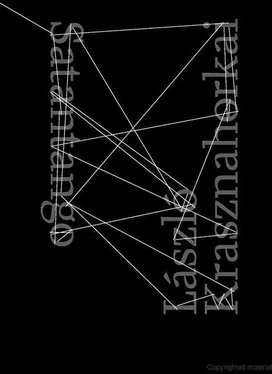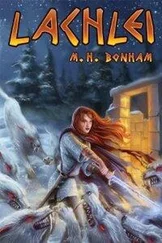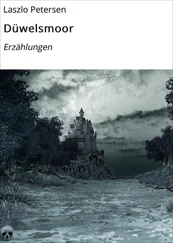László Krasznahorkai
Satantango
In that case, I’ll miss the thing by waiting for it.
— FK
One morning near the end of October not long before the first drops of the mercilessly long autumn rains began to fall on the cracked and saline soil on the western side of the estate (later the stinking yellow sea of mud would render footpaths impassable and put the town too beyond reach) Futaki woke to hear bells. The closest possible source was a lonely chapel about four kilometers southwest on the old Hochmeiss estate but not only did that have no bell but the tower had collapsed during the war and at that distance it was too far to hear anything. And in any case they did not sound distant to him, these ringing-booming bells; their triumphal clangor was swept along by the wind and seemed to come from somewhere close by (“It’s as if they were coming from the mill. .”). He propped himself on his elbows on the pillow so as to look out of the mouse-hole-sized kitchen window that was partly misted up, and directed his gaze to the faint blue dawn sky but the field was still and silent, bathed only in the now ever fainter bell sound, and the only light to be seen was the one glimmering in the doctor’s window whose house was set well apart from the others on the far side, and that was only because its occupant had for years been unable to sleep in the dark. Futaki held his breath because he wanted to know where the noise came from: he couldn’t afford to lose a single stray note of the rapidly fading clangor, however remote (“You must be asleep, Futaki. .”). Despite his lameness he was well known for his light tread and he hobbled across the ice-cold stone floor of the kitchen, soundless as a cat, opened the windows and leaned out (“Is no one awake? Can’t people hear it? Is there nobody else around?”). A sharp damp gust hit him straight in the face so he had to close his eyes for a moment and, apart from the cockcrow, a distant bark, and the fierce howling of the wind that had sprung up just a few minutes earlier, there was nothing to hear however hard he listened but the dull beating of his own heart, as if the whole thing had been merely a kind of game or ghostly half-dream (“. . It’s as if somebody out there wants to scare me”). He gazed sadly at the threatening sky, at the burned-out remnants of a locust-plagued summer, and suddenly saw on the twig of an acacia, as in a vision, the progress of spring, summer, fall and winter, as if the whole of time were a frivolous interlude in the much greater spaces of eternity, a brilliant conjuring trick to produce something apparently orderly out of chaos, to establish a vantage point from which chance might begin to look like necessity. . and he saw himself nailed to the cross of his own cradle and coffin, painfully trying to tear his body away, only, eventually, to deliver himself — utterly naked, without identifying mark, stripped down to essentials — into the care of the people whose duty it was to wash the corpses, people obeying an order snapped out in the dry air against a background loud with torturers and flayers of skin, where he was obliged to regard the human condition without a trace of pity, without a single possibility of any way back to life, because by then he would know for certain that all his life he had been playing with cheaters who had had marked the cards and who would, in the end, strip him even of his last means of defense, of that hope of some day finding his way back home. He turned his head towards the east, once the home of a thriving industry, now nothing but a set of dilapidated and deserted buildings, watching while the first rays of a swollen red sun broke through the topmost beams of a derelict farmhouse from which the roof tiles had been stripped. “I really should make the decision. I can’t stay here any longer.” He snuck back under the warm duvet again and rested his head on his arm, but could not close his eyes; at first it had been the ghostly bells that had frightened him but now it was the threatening silence that followed: anything might happen now, he felt. But he did not move a muscle, not until the objects around him, that had so far been merely listening, started up a nervous conversation (the sideboard gave a creak, a saucepan rattled, a china plate slid back into the rack) at which point he turned away from the sour smell of the perspiring Mrs. Schmidt, felt with his hand for the glass of water left standing by the bed and drained it at one gulp. Having done so he was free of his childish terror: he sighed, wiped his sweating brow and, knowing that Schmidt and Kráner were only just now rounding up the cattle to drive them west from the Szikes towards the farm byres in the west where they would eventually receive eight-months’ worth of hard-earned wages, and that this would take a good couple of hours, he decided to try and get a bit more sleep. He closed his eyes, turned on his side, put his arm around the woman and had almost succeeded in nodding off when he heard the bells again. “For God’s sake!” He pushed aside the duvet but the moment his naked calloused feet touched the stone floor the bells suddenly stopped (“As if someone had given a signal. .”). . He sat hunched on the edge of the bed his hands clasped in his lap till the empty glass caught his attention. His throat was dry, his right leg was suffering shooting pains, and now he did not dare either get up or go back under the covers. “I am leaving by tomorrow at the very latest.” He surveyed the vaguely functioning articles in the bare kitchen, from the cooking range filthy with burned fat and leftover scraps to the basket without a handle under the bed, the rickety table, the dusty icons hanging on the wall, and the saucepans, his eye finally resting on the tiny window and the bare branches of the acacia bending across the Halicses’ house with its dented roof and teetering chimney, the smoke billowing from it, and said, “I’ll take what’s mine and go tonight!. . No later than tomorrow at any rate. Tomorrow morning.” “Dear God!” Mrs. Schmidt cried, waking suddenly and stared about her in the dusk, terrified, her chest heaving, but when she saw that everything looked back at her with a familiar expression she gave a relieved sigh and slumped back on the pillow. “What’s the matter? Bad dreams?” Futaki asked her. Mrs. Schmidt was staring at the ceiling in fright. “Good Lord, really horrible dreams!” She sighed again and put her hand on her heart. “Such things! Me?!. . Who’d have imagined?. . There I was sitting in the room and. . suddenly there was a knock at the window. I didn’t dare to open it, just stood there, peeking through the curtains. I only saw his back because by now he was shaking the door-handle, and then his mouth as he bellowed. God know what he was saying. He was unshaven and it seemed his eyes were made of glass. . it was horrible. . Then I remembered I had only given the key one turn the previous night and knew that by the time I got there it would be too late so I quickly slammed the kitchen door, but then I realized I didn’t have the key. I wanted to scream but no sound came from my throat. Then I don’t exactly recall why or how but suddenly Mrs. Halics was at the window making faces — you know what it’s like when she makes faces — and anyway, there she was staring into the kitchen and then, I don’t know how, she vanished, though by that time the man outside was kicking at the door and would have been through it in a minute, and I thought of the bread-knife and dashed over to the cupboard but the drawer was jammed and I kept trying to open it. . I thought I would die of terror. . Then I heard him smash the door open and he was coming down the hall.
Читать дальше











